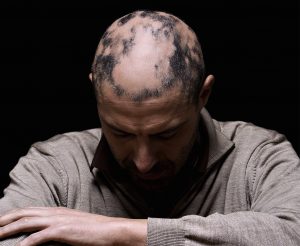
ALOPECIA AREATARESEARCH STUDY
Alopecia Areata Affects Nearly Seven Million People. Are You One of Them?
Alopecia areata (AA) is characterized by reversible hair loss where the hair follicle is preserved. Approximately 2% of the general population is affected by this condition. AA typically manifests itself by hair loss involving the scalp, eyebrows, beard, and/or body. It can appear as small to large circles of hair loss to total loss of hair in the scalp and body hair.
There are no FDA-approved therapies for AA. Available treatments include topical agents, such as minoxidil, corticosteroids (injections, oral or topical), phototherapy, dietary modifications and topical immune therapy. However, these treatments have mostly a temporary and inconsistent effect.
Our Study
A clinical research study now underway in Birmingham is seeking volunteers who have lost at least 50% of the hair on their head to determine the safety, tolderability, and efficacy of rosnilimab as a treatment for AA. Rosnilimab is an antibody — a substance that attaches itself to other substances or cells in the body. By doing so, it can modify the way these substances or cells act in the body.
Rosnilimab is an antibody that works by inhibiting T cell activity. By inhibiting T cell activity, rosnilimab may work as a treatment for autoimmune and inflammatory diseases such as AA. This research study will help determine if rosnilimab is safe and effective as a treatment for AA.
Qualified Participants May Receive:
- Study-related care at no cost
- Study-related investigational medication at no cost
- Reimibursement for their time and travel